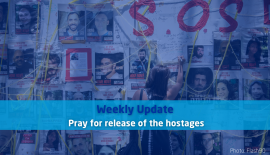Weekly Update: Desecration of the Temple, and the festival of lights
Next week, the Jewish people will celebrate Hanukkah – the “Festival of Lights”. It is a festival full of significance for all people – Jews and Gentiles.
The miracle of Hanukkah is not recorded in the Tenach. But we know the festival was an important event in the life of observant Jews, even before the time of Jesus. In the New Testament, John 10:22–23 says, “Then came the Festival of Dedication at Jerusalem. It was winter, and Jesus was in the temple courts walking in Solomon’s Colonnade” (NIV).
Hanukkah marks the miraculous victory in the 2nd century BCE of the Maccabees over Antiochus IV Epiphanes who had massacred Jews and profaned the Temple. Just as miraculous is, when the Maccabees cleansed and restored the worship in the Temple, the reported lighting of the lamp with oil that was – humanly speaking – only enough for one day, and yet kept the lamp alight for eight days until more oil could be pressed.
Hanukkah has many levels of meaning and significance. In relation to the nations, Hanukkah reminds us that 1. the thinking and powers of this world are in direct conflict with the purposes of the God of Abraham, Isaac and Jacob; 2. those powers will do all they can to extinguish the light that emanates from God’s dwelling place; 3. these powers will be fulfilled in an Antichrist who will seek to place himself in the Temple (see Rev. Glashouwer’s teaching below); 4. there will always be those who are separated from the world, who are dedicated to serving God, and who are willing to fight to the death to preserve the name of the Holy God; 5. God will ensure they have the victory; and 6. He will also ensure that – despite apparent lack of resources or strength – the light will shine in the darkness.
Today, we witness new manifestations of the spirit of the Syrian/Greek ruler Antiochus IV Epiphanes.
In New York, Geneva and The Hague, many nations – in the name of peace and human rights – are voting time and again to deny the right of Jews to live as a nation within secure borders. They deny Jews the right to live in Jerusalem, Judea or Samaria – the land to which they are so intimately connected. They are voting to erase the historic Jewish connection with the land, and to demonize the Jews as enemies of peace. In short, they are seeking to defile God’s dwelling place, to extinguish the light that the Jewish people are called to be to the nations, and to prevent fulfilment of the prophecy of the Angel to Mary that Jesus would reign on the throne of His father David in Jerusalem in the midst of Jacob (Luke 1:32-33).
Most recently, on 3 December a majority of the 194 UN member states again performed their annual ritual of adopting a series of resolutions that can only be described as a desecration of God’s Holy Name. Only a small number of states voted against these resolutions, and – as usual – quite a few abstained.
How will we respond – as nations, as a church? Are we willing to fight like the Maccabees to restore God’s Holy name? Chapter 3 of the book of Revelation records the letter of Jesus to His church in the later days (Laodicea): “if you are lukewarm I will spit you out of my mouth.”
The time has come for those who are willing to stand up for God’s holy name to be counted – whatever the cost. And God will give the victory. The enemies of righteousness will be defeated – against all odds – and His light will shine in the darkness.
Maranatha.
Hamas, Thirty-Two Years Later
By Khaled Abu Toameh, Gatestone Institute
Now that Hamas has again – clearly – reminded the world that it has not changed and continues to seek the destruction of Israel, the question is: Why are some world leaders, governments and organizations continuing to embrace the leaders of the movement?
Read more
US pushes back at UNSC’s stance on illegality of West Bank settlements
By Tovah Lazaroff, Times of Israel
The United States pushed back against the United Nations Security Council stance that West Bank settlements are illegal, declaring that the Trump Administration opposed the 2016 Resolution 2334 that condemned such activity. “It will not surprise anyone in this chamber to hear me say that the Trump Administration strongly opposes Resolution 2334. It is one-sided. It is unfairly critical of Israel,” US Ambassador to the UN Kelly Craft told the UNSC in New York on Wednesday. The US holds the rotating UNSC presidency position this month.
In 2016, the US refused to use its veto power and allowed resolution 2334 to pass with the support of the other 14 committee UNSC members.
Read more..
United Nations resolutions condemn Israel – again
On 3 December 2019 the General Assembly adopted five resolutions on the question of Palestine and the Middle East, including one calling on Member States “not to recognize any changes to the pre-1967 borders, including with regards to Jerusalem, other than those agreed by the parties through negotiations.”
Through the terms of the text titled “Peaceful settlement of the question of Palestine” (document A/74/L.15) — adopted by a recorded vote of 147 in favour to 7 against (Australia, Canada, Israel, Marshall Islands, Federated States of Micronesia, Nauru, United States), with 13 abstentions — the Assembly called on Member States to ensure that agreements with Israel do not imply recognition of Israeli sovereignty over the territories it occupied in 1967. The Assembly reiterates its call for the achievement of a just, lasting peace in the Middle East and an end to the Israeli occupation, while calling on Israel, the occupying Power, to comply strictly with international law, cease actions aimed at altering the demographic composition of the Territory, and immediately halt all settlement activities.
By the terms of a resolution titled “The Syrian Golan” (document A/74/L.9), adopted by a recorded vote of 91 in favour to 9 against (Australia, Brazil, Canada, Israel, Marshall Islands, Federated States of Micronesia, Palau, United Kingdom, United States), with 65 abstentions, the Assembly declares that the Israeli decision to impose its laws, jurisdiction and administration on the occupied Syrian Golan is null and void and demands that Israel withdraw from the territory.
The Assembly also adopted by recorded vote three resolutions dealing with the United Nations system’s own provision of support to the Palestinian people. The first — titled “Committee on the Exercise of the Inalienable Rights of the Palestinian People” (document A/74/L.14) — requests the Committee to exert all efforts to promote the right to self‑determination of Palestinians and to support the achievement of an end to Israeli occupation.
In the second of those texts titled “Division for Palestinian Rights of the Secretariat” (document A/74/L.16), the Assembly requests the Division to continue to monitor developments relevant to the question of Palestine. Through the third such resolution, “Special information programme on the question of Palestine of the Department of Global Communications of the Secretariat” (document A/74/L.17) the Assembly requests the Department disseminate information on activities of the United Nations system relating to the question of Palestine and peace efforts.
Read more..
The Jewish festival of Hanukkah
The eight-day Jewish celebration known as Hanukkah or Chanukah commemorates the rededication during the second century B.C. of the Second Temple in Jerusalem, where Jews had risen up against their Greek-Syrian oppressors in the Maccabean Revolt. Hanukkah, which means “dedication” in Hebrew, begins on the 25th of Kislev on the Hebrew calendar and usually falls in November or December. Often called the Festival of Lights, the holiday is celebrated with the lighting of the menorah, traditional foods, games and gifts.
The events that inspired the Hanukkah holiday took place during a particularly turbulent phase of Jewish history. Around 200 B.C., Judea—also known as the Land of Israel—came under the control of Antiochus III, the Seleucid king of Syria who allowed the Jews who lived there to continue practicing their religion. His son, Antiochus IV Epiphanes, proved less benevolent: Ancient sources recount that he outlawed the Jewish religion and ordered the Jews to worship Greek gods. In 168 B.C., his soldiers descended upon Jerusalem massacring thousands of people and desecrating the city’s holy Second Temple by erecting an altar to Zeus and sacrificing pigs within its sacred walls.
Read more..
This year (2019), Hanukkah is from 22 to 30 December.
“Focus on the future” – Video teachings by Rev. Willem J.J. Glashouwer
Rev. Willem Glashouwer helps us understand God’s prophetic word, and how prophecy is being fulfilled in our generation.
Volume 2 episode 7: The end times started to develop since the first coming of Jesus on the earth. These final days will have a final hour and that final hour will mean that one day a worldwide empire will arise with a figurehead on top of it that the Bible calls the antichrist, or the beast or the lawless one. It is only God who can make it happen that someone will be in authority. Revelation 13, talks about this expression which is also a consolation, a comfort for the people of God. There it says that “to him was given” and it is repeated several times. How long will his empire last and will all the inhabitants of the earth worship the beast?
“In the footsteps of Abraham” – Video teachings by Johannes Gerloff
Watch this series of teachings by Israeli-based Bible teacher and journalist Johannes Gerloff:
Episode 7: Who would not like to be in a direct, intimate relationship with the Creator of heaven and earth? We would like to walk with Him, like Adam in the Garden of Eden or like Abram. However, there is a less convenient condition that comes with God’s choice.
View Amir Tsafarti’s latest update:
View Bible teacher Amir Tsafarti’s latest weekly roundup (16th December 2019):
Shabbat shalom,
Andrew Tucker
Editor-in-Chief – Israel & Christians Today
Scripture for the week: John 8:12-20
12 When Jesus spoke again to the people, he said, “I am the light of the world. Whoever follows me will never walk in darkness, but will have the light of life.”13 The Pharisees challenged him, “Here you are, appearing as your own witness; your testimony is not valid.”14 Jesus answered, “Even if I testify on my own behalf, my testimony is valid, for I know where I came from and where I am going. But you have no idea where I come from or where I am going. 15 You judge by human standards; I pass judgment on no one. 16 But if I do judge, my decisions are true, because I am not alone. I stand with the Father, who sent me. 17 In your own Law it is written that the testimony of two witnesses is true. 18 I am one who testifies for myself; my other witness is the Father, who sent me.”19 Then they asked him, “Where is your father?”“You do not know me or my Father,” Jesus replied. “If you knew me, you would know my Father also.” 20 He spoke these words while teaching in the temple courts near the place where the offerings were put. Yet no one seized him, because his hour had not yet come.
The goal of Israel & Christians Today is to help Christians to take God’s Word seriously, and study current events in the world in the context of the Bible.
Click here to subscribe.





